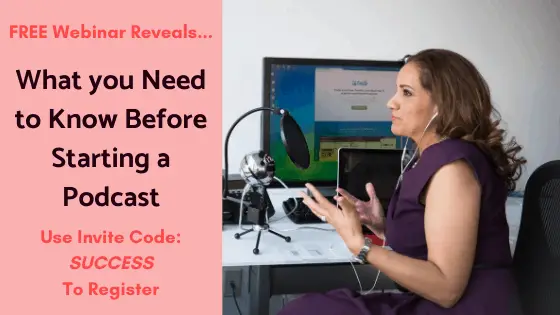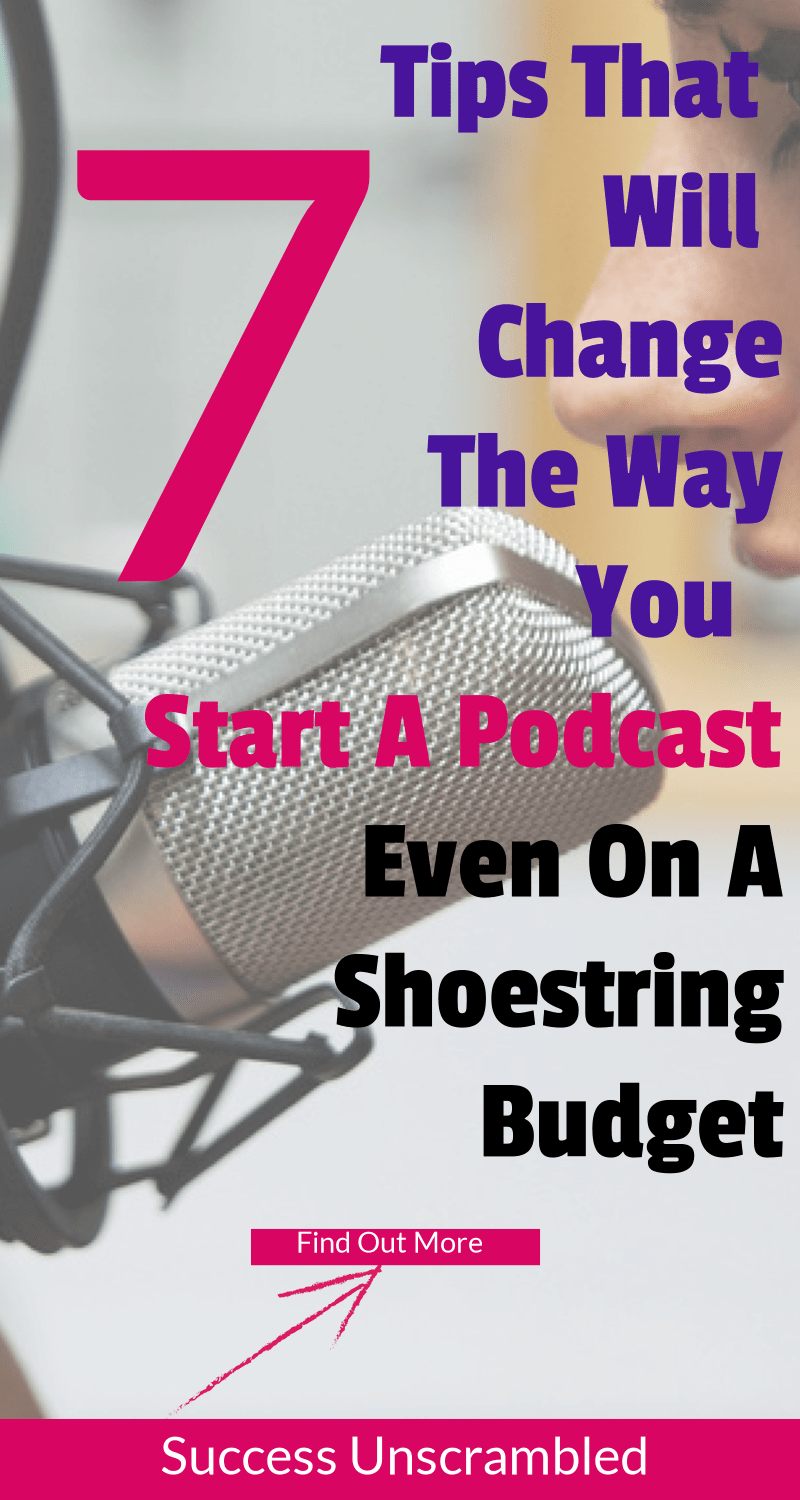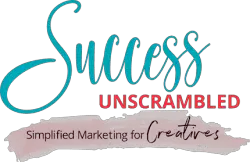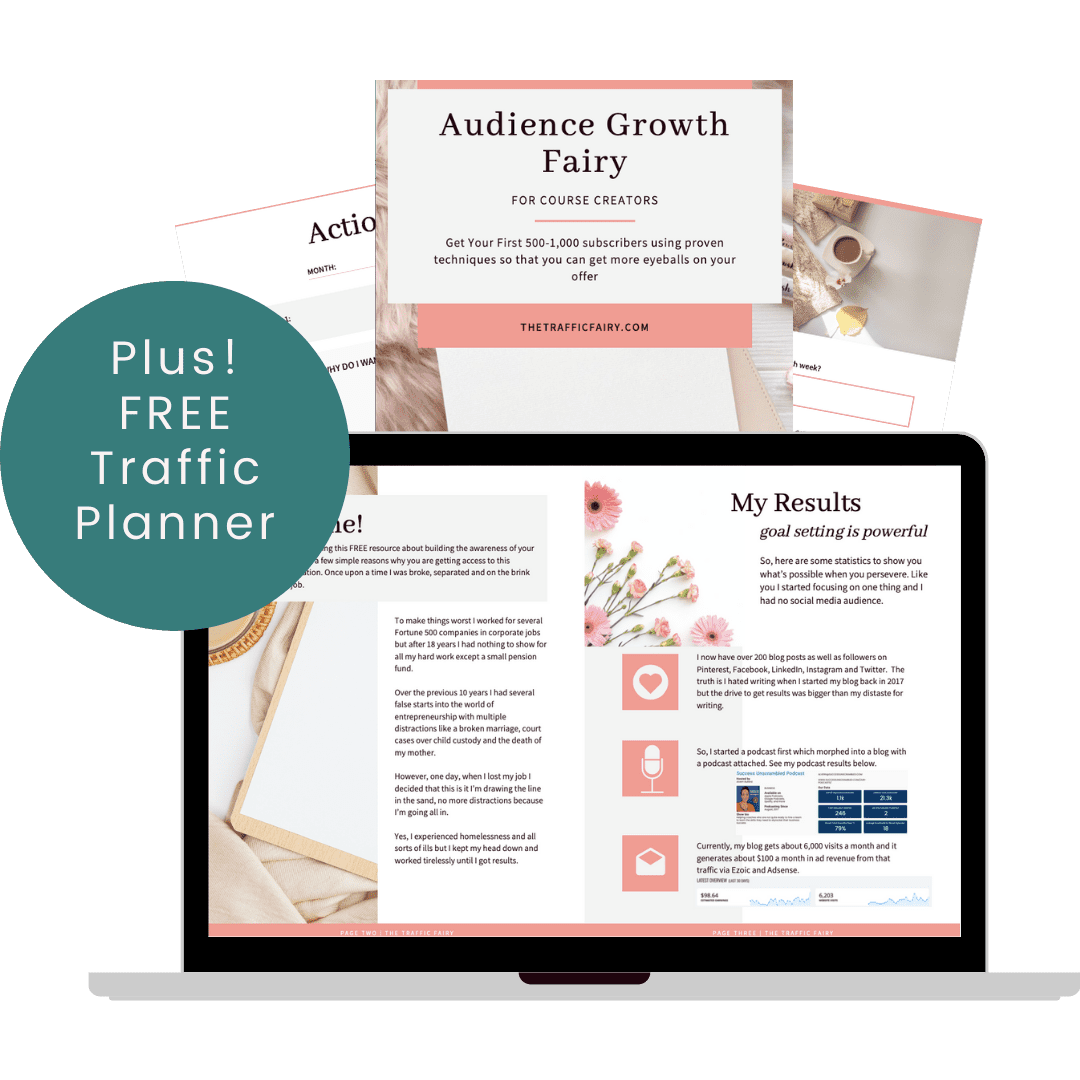Podcast: Play in new window | Download (Duration: 43:51 — 40.1MB) | Embed
Subscribe: Spotify | Amazon Music | Email | TuneIn | Deezer | RSS | More
Here are the deets about how to start a podcast from someone who has done it from trial and error. I wanted to find out for myself rather than copying someone else’s choices.
Yes, I made mistakes but you don’t have to at all. The truth is I love adventure.
It feels like it was yesterday when I took the plunge into the world of podcasting. I do remember always wanting to get started but I felt that I needed all the professional equipment to get stuck in.
I investigated all the bits and pieces of technology and started to save but that all fell to pieces when I found out that I need to have major surgery.
How on earth am I ever going to achieve the goal of starting a podcast with all these obstacles that keep popping up?
Two months before I began I decided to do some heavy reading on how to start a podcast. There is a lot of material available as well as several different blogs.
Almost all the ‘experts’ advise on getting a microphone so I had my eyes and heart set on the beautiful Rode Podcaster.
Have you set your eyes on this beauty? Hmm! They all suggest getting a mic stand and pop filter to reduce the spittle and have P and S sounds.
You may be surprised to learn that as of this writing, episode 22 I still have not obtained a microphone.
Shocking! I know so how on earth can I do so many episodes without a professional microphone?
Well, stay tuned to find out more as my journey was not an easy one but it surely is worth it as I am really enjoying every moment.
So, if you need to know how to start a podcast here is the 7 really important steps that you need:
- Mindset
- Niche Research
- Frequency
- Equipment
- Podcast Hosting
- Marketing
- Design
Let’s do a deep dive into each of these items to get a better understanding of what is needed for you to become successful.
1. Mindset
Picture this, you get all excited and jump in then by episode 4 you realise that actually, this may not be for you after all.
Think about the amount of time, energy, preparation and savings (not too much) you would have invested at this point only to leave your listeners wondering what on earth is going on?
So, the right mindset is super duper important if you really want to know how to start a podcast.
Just like a blog a podcast would need dedication, passion, interest and long-term input in order to reap the fruits of your labour.

Click here to register for the Free Webinar and learn how to start a podcast.
2. Niche Research
Can’t I just see how it goes? Do I really need to do niche research?
Hello! Of course, you need niche research, how are you going to know what your audience wants?
Where they hang out and how are you going to last 5 years finding topics regularly to talk about?
No matter how passionate you are about a topic niche research will help you to structure your podcast episodes.
You will be able to do it in such a way that you are adding value to the lives of your audience.
I already covered niche market ideas for your business in a previous podcast to check that out for the details on how you can conduct some niche research.
3. Frequency
How often will you be producing an episode is the question you need to address very early on if you want to know how to start a podcast.
The reason is that a podcast is a series of episodes so the moment you create one then you would be expected to continue with the series.
Do you have the time to create a podcast episode every day? Every week, 2 weeks or month?
This is going to be very important as it also helps you decide how much monthly hosting you would need to make your podcast always available to your audience.
Also, as I already mentioned in a previous paragraph you will need to take the time every week or month or day to create the content and do the post-production for each episode.
4. Equipment
The most important items when you want to know how to start a podcast are the pieces of equipment and software needed to record each episode as well as the bits for post-production.
I most say in the early stages I hated post-production because it took me forever and it felt a bit like hit or miss.
All the experts talk about the nightmare of finding the perfect quiet location to record an episode.
It is true that the better the quality of the recording then the less time and money you need to spend doing the post-production of an audio recording.
Here is a list of items that many of the podcasting gurus advised on broken down by categories:
Recording Software
- Audacity
- Garage Band
- Google Hangouts
- Skype + Ecamm recorder (guest podcasts)
- Pamela for Skype
- Screenflow
- Zencastr
Podcast Recording Studio Equipment
- Rode Podcaster
- Blue Yeti Microphone
- Pop Filter
- Beats Studio 2 Headphones
- Microphone Stand
- Audio Technica ATR2100 USB or XLR (mixer)
Post-Production Software
- Camtasia
- Filmora
- Adode Auditions
- Auphonic
Here is what I actually use every week
- Spreaker desktop software for recording (brilliant for guest via Skype)
- Apple earphones (mic)
- Filmora for the first draft
- Auphonic for the final version
I am not saying that my podcasts are perfect but they are good enough to publish and to gain feedback from the audience as to how things are going and what I need to improve.
The reason why I decided not to invest in pricey equipment at the beginning is that I needed to ensure that I can get all the way to episode 20.
It is a way to prove to myself that I am capable and that I have an interested and engaged audience who is interested in what I want to share.
Hey! 22 months ago this whole podcasting performance was an idea for me. I needed to make it a reality so I did and you know what so can you.
5. Podcast Hosting
In order to make your podcast episodes available to your audience 24/7, you need to pay for podcast hosting.
The good news is that in order for you to learn how to start a podcast in your specific niche you don’t have to do like I did and try out 10 different podcast hosts (okay it was more like 5, haha!).
Here are the top 10 on the market.
- Libsyn
- Blubrry
- Blog Talk Radio
- Spreaker
- Podbean
- Buzzsprout
- Fireside
- Soundcloud
- Simplecast
- Zencast.fm
Click here to register for the Free Webinar and learn how to start a podcast.
Podcast Equipment
Here are the 5 that I tried out along with commentary:
- Libsyn – great podcast host but it just did not suit my needs. It added to my post-production time every month as I had to copy and paste the script and description from Wordpress to Libsyn.
- Blubrry – very practical podcast host especially very budget friendly, listed as the largest podcast directory, podcasts statistics included. Their Wordpress.org plugin is the bomb!
- Blog Talk Radio – I am still not sure what happened but I recorded one of my guest podcast and it was not a very pleasant experience to get going.
- Soundcloud – It just felt like it was better suited to music rather than podcast episodes I didn’t feel the love at all.
- Spreaker – lovely little podcast host. They are so brilliant for not only hosting but for recording a guest podcast.
Currently, I use both Blubrry and Auphonic every single week by uploading the audio file edited in Filmora and Auphonic to Blubrry.
I did try using Spreaker alone but that was a disaster as they don’t have a comprehensive plugin like Blubrry.
Blubrry does not have the facility to record guest interviews I use Skype plus Ecamm call recorder to record guest interviews.
Each of these two hosts had the added benefit of their own or existing podcast listeners.
These people listened to my podcasts without me doing any marketing which is great.

Click here to register for the Free Webinar and learn how to start a podcast.
6. Marketing Your Podcast
One thing you need to consider as part of your plan to let your audience know about your podcast is marketing. Some of the ways to make this a reality include:
- Social Media
- SEO
- Podcast directories
- Guest podcasting
As the focus of this post is to facilitate a discussion about how to start a podcast I will touch on those four areas briefly.
Social Media
As you probably know there are several social media platforms available. The best one to use will depend on your audience as well as your overall marketing plan.
It also depends on the goal you are trying to achieve. For example, are you trying to build awareness? Generate leads? Make sales?
Are you a business to business or business to consumer? Marketing your podcast is so comprehensive that it would take a series to cover this topic.
A few pointers that I can give you is that LinkedIn is great for growing your network and it is a great business to business platform.
You can generate business on Facebook as well but the approach would be different. Lead generation can also occur on Twitter if your audience hangs out there.
Search Engine Optimization (SEO)
Each podcast episode you create should focus on one of your main keywords as it will help your podcast to rank in the Search Engine Results Pages (SERP) for the keywords that you use.
When you create each episode you have a choice of creating show notes, a transcript or a blog post like I am doing here for this episode on how to start a podcast.
The topic of SEO itself is quite comprehensive and it is not possible for me to cover it in this episode.
A few points you should consider which are on page and off-page SEO where on-page will relate to keywords, meta description, title, image, alt tags, keyword count etc.
While off-page will cover things like the number of links coming back to your page, the age of the domain name, the weight of the links that point back to your page, good neighbourhoods, etc.

Click here to register for the Free Webinar and learn how to start a podcast.
Podcast Directories
Where do I begin with this one? Well, there are so many places that people who are searching for a podcast can find you. The most obvious places are podcast directories.
Other places that are popular are iTunes, Stitcher, TuneIn, iHeartRadio, Zune Marketplace, Blubrry, Soundcloud and many more.
If you decide to use Blubrry as your podcast host then they can help you generate a podcast feed that will produce an RSS feed which you can then submit to all the many directories out there in the ‘podcastsphere’ (is that even a word?). You can find out more step by step instructions here.
Guest Podcasting
Another clever way to let your audience know that you exist is by guest podcasting. This simply means that you can volunteer to be a guest on someone else’s podcast show.
This may be obvious but you want to ensure that a good size of your audience listens to this podcast regularly before deciding to be a guest.
Of course, you can use the first few as a way to practice and get rid of stage fright or blunders before being a guest on more popular ones. All the same, it is an option for you to decide to do it or if it makes sense for your business or show.
7. Design
Three things that you need to consider when you want to know how to start a podcast are:
- Podcast cover
- Colour Palettes
- Fonts
You will need a podcast cover that has a minimum size of 1400 x 1400 with a maximum of 3,000 x 3,000 pixels if you want any directory to take your podcast seriously.
The minimum size required to be accepted into the iTunes podcast directory is 1,400 x 1,400. Head on over the fiverr.com and hire someone there to do it for you.
A colour palette is important when it comes to branding your podcast consistently. So choose your colours based on the way you want your audience to perceive you and your business.
Choosing complimentary fonts that represent the mood and brand of your business are so very important for consistently and creating a brand in the mind of your audience.
If you want to build a brand for your business take a look at what I covered in a previous podcast.

Click here to register for the Free Webinar and learn how to start a podcast.
Conclusion
That ladies brings me to the end of this episode. I hope you found it useful to help you easily transition from just blogging with a view to adding another way for your audience to engage with your beautiful content.
The question though is does it make sense for you and your business? Do you have what it takes to spend time creating this kind of content on a frequent basis? Now you know how to start a podcast from someone who did it.
Okay ladies, thanks so much for reading and listening. Remember to subscribe to be the first to get access to the episodes that are coming up in the next few weeks.
I have a few surprises for you and they are keeping me excited. I am not going to spill the beans just yet but it will be worth your while and very focused on success.
Enjoy the rest of your day and the rest of your week. Bye for now.




2 thoughts on “How To Start A Podcast In 7 Simple Steps”
Comments are closed.